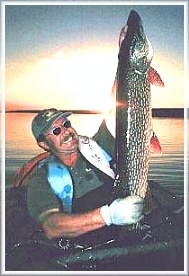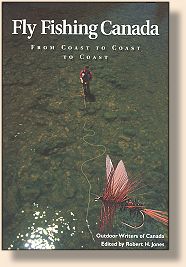Pike on "Dry Flies"
By Clive Schaupmeyer
From Fly Fishing Canada, Published by Johnson Borman Publishers
Pike eat primarily below the surface, but at times floating flies provide
exciting top-water action. This is more likely to happen when the sun is low, which
for most of us is toward sunset versus early morning.
Calm water are generally best, but if it's choppy, pike will often strike
floating flies that make lots of noise. Poppers with flat-faced heads
are recommened as they make an audible "sploosh" when stripped.
Floating pike flies have two basic parts: a body-tail section and a foam
head. The 5-8" (13-20-cm) body-tail consists of a few strands of feathers,
frayed yarn, and synthetic hair or similar willowy material. If tying your
own, use yellow, chartreuse or orange body materials, and highlight it with
gold, pearl or silver flash strands. Local experience may dictate other
color combinations. Dress them lightly to avoid absorbing too much water,
which interfers with casting.
Flies are supported in the water by foam heads. They can be purchased from
fly shops, or made by punching cylindrical plugs from the type of high-density
foam used in knee pads and beach sandals. Use a short section of 0.5" diameter
copper or brass tubing, sharpened at one end as a punch. Taper the head with
a sharp knife, scissors or coarse sandpaper, and then punch a small hole
lengthwise through the head to accept the hook eye.
After securing the body-tail material to the hook, wrap the shank behind
the eye with a single layer of yarn and coat it with head cement, Pliobond or
Goop, then push the head over the eye and onto the shank. Mount the taper
forward for a slider, or flat-face-forward for a popper. Simply leave the
head force-fitted, or secure it with a few wraps of thread over the tapered
end.
Retrieval techniques are simple: Cast, take up the slack, then strip
in a few inches every second or two. Pause occasionaly and let the
fly sit for several second. Vary the timing, speed and distance of
each strip until you find a productive combination.
One clear advantage of floating flies is they can be tossed into small
openings where weedless, sinking flies won't work. It can sit and be
twitched, then slowly retrieved in clearings no larger than a bathtub.
If they ignore your floating slider, try a larger pattern, a different
color, or a noisy popper.
 Strikes can be awesome - a pike may take you by complete surprise by
leaping clear of the water to grab your fly on the way up or down.
Most strikes are less spectacular, but still rather startling. A
Pike may approach from behind or the side; then its body will half
emerge the instant it attacks. There there are those heart-arresting
attacks that start several feet away . . .The water swells up from
stage left and a wave races toward your fly. It's hard not to pull
the fly away from these aggressive attacks, but delay striking by
simply raising the rod. Most pike will get hooked on their own - or not.
~ Clive
Strikes can be awesome - a pike may take you by complete surprise by
leaping clear of the water to grab your fly on the way up or down.
Most strikes are less spectacular, but still rather startling. A
Pike may approach from behind or the side; then its body will half
emerge the instant it attacks. There there are those heart-arresting
attacks that start several feet away . . .The water swells up from
stage left and a wave races toward your fly. It's hard not to pull
the fly away from these aggressive attacks, but delay striking by
simply raising the rod. Most pike will get hooked on their own - or not.
~ Clive
Drives away winter chills
(Makes four servings)
1 lb - boneless pike, cubed - 500 g
4-6 slices bacon, diced
1 onion, diced
1 red pepper, diced
2 potatoes, diced
1 tbsp - fresh tarragon - 15mL
or 1 tsp - dried tarragon - 5 mL
4 bay leaves
4-6 cups - milk - 1,500mL
1 cup - kernel corn - 250mL
Pinch - cayenne pepper
Salt and pepper to taste
Beurre manie* or bread slices
Fresh chopped chives, garnish
Optional - diced mushrooms, celery, carrots or squash
1. Saute bacon, onions and red pepper in a stock pot. Add
potatoes, tarragon, bay leaves and milk. Simmer until potatoes are
nearly done.
2. Add corn; simmer 5 minutes. Add cubed pike and cayenne pepper.
Simmer 5 minutes. Season with salt and pepper to taste. Remove
bay leaves and discard.
3. Thicken chowder with buerre manie and garnish with fresh chopped
chives. If preferred, mushrooms, celery, carrots, squash or other
vegetables may be added.
*Buerre manie: Equal amounts of softened butter and flour creamed
together. About 3 tbsp (45mL) of each should be sufficient. If
preferred, rather than beurre manie, you may place a thick slice
of bread in the bottom of a soup bowl and ladle chowder over it.
~ Wayne Phillips
|
 For more on fishing pike, see Clives series:
Fly-fishing for Prairie Pike, in our From Canada section.
For more on fishing pike, see Clives series:
Fly-fishing for Prairie Pike, in our From Canada section.
Credits: From Fly Fishing Canada, From Coast to Coast to Coast
By Outdoor Writers of Canada, Published by Johnson Gorman Publishers.
We appreciate use permission!
Our Man In Canada Archives
|

 For more on fishing pike, see Clives series:
Fly-fishing for Prairie Pike, in our From Canada section.
For more on fishing pike, see Clives series:
Fly-fishing for Prairie Pike, in our From Canada section. Strikes can be awesome - a pike may take you by complete surprise by
leaping clear of the water to grab your fly on the way up or down.
Most strikes are less spectacular, but still rather startling. A
Pike may approach from behind or the side; then its body will half
emerge the instant it attacks. There there are those heart-arresting
attacks that start several feet away . . .The water swells up from
stage left and a wave races toward your fly. It's hard not to pull
the fly away from these aggressive attacks, but delay striking by
simply raising the rod. Most pike will get hooked on their own - or not.
~ Clive
Strikes can be awesome - a pike may take you by complete surprise by
leaping clear of the water to grab your fly on the way up or down.
Most strikes are less spectacular, but still rather startling. A
Pike may approach from behind or the side; then its body will half
emerge the instant it attacks. There there are those heart-arresting
attacks that start several feet away . . .The water swells up from
stage left and a wave races toward your fly. It's hard not to pull
the fly away from these aggressive attacks, but delay striking by
simply raising the rod. Most pike will get hooked on their own - or not.
~ Clive